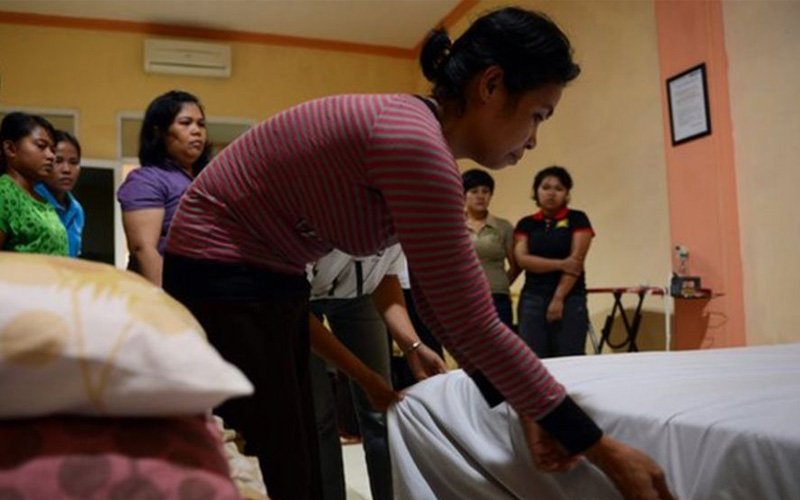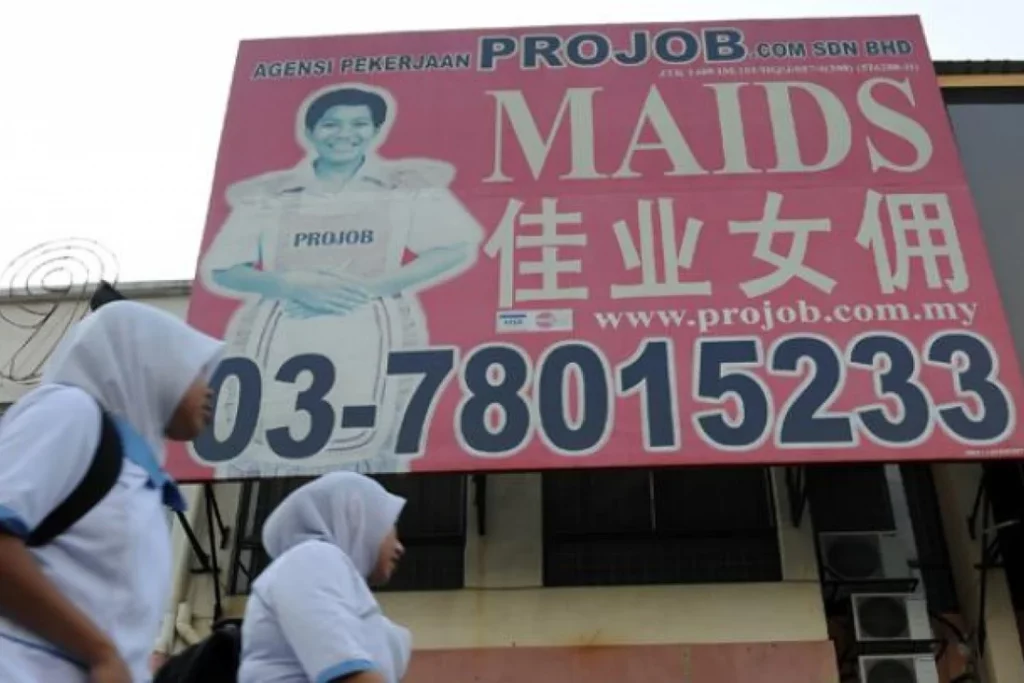[Trigger Warning (TW): Violence, Sexual Assault]
In the past, domestic workers or maids were seen as a status symbol and only affluent households can afford them. However, with the growth of dual-income households and the ageing population, domestic workers are seen as a necessity, a helping hand to attend to children and the elderly.
With the endemic upon us, businesses are up and running once more. Parents are returning to offices, children to schools – the morning rush of the pre-pandemic times is slowly setting in.
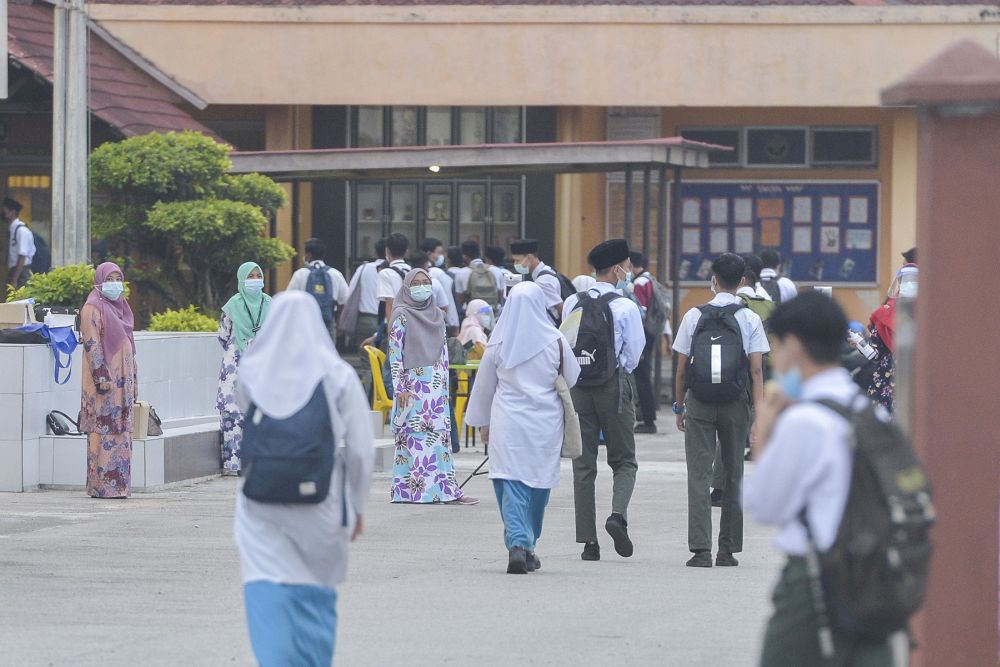
Families are desperate to have extra help to deal with household chores and tend to their children. Hana, a pregnant housewife expresses her desperation for additional hands in her home.
I’m pregnant and have two children at home. As my husband is away for three months, I am the only adult in the house and I also have to work from home, so I desperately need another pair of hands in the house. – Hana, 30 years old, data analyst[1]
The border closure due to the pandemic has contributed to shortages of at least 30,000 foreign maids in Malaysia[2].
Their absence is felt by households who have been reliant on help or need help. Tasha Prasheela Chandran has been searching high and low to hire a domestic helper to assist her mother-in-law after the previous employee left in late 2021.
Since then, we have tried to find a replacement, as my mother-in-law is 75 years old and living alone. She needs help with cooking, cleaning and the general maintenance of her house. – Tasha Prasheela Chandran, 36 years old lawyer[3]

There has been a long wait of up to 8 months at maid recruitment agencies.
Around 600 maid agencies under category B and C licences want to hire foreign domestic maids to work in Malaysia, where there are at least 50 requests on the waiting list for each agency. – Datuk Foo Yong Hooi, Malaysian Association of Employment Agencies (PAPA) president[2]
A new memorandum of understanding (MoU) has been under negotiation with Indonesia since 2016. However, considering the track record of Malaysian employers’ treatment of Indonesian domestic workers, there has been pushback and hesitancy from the Indonesian government.
The Reason Behind Rounds Of Negotiation
In 2009, the Indonesian government barred their citizens from taking new jobs as domestic workers in Malaysia following barrages of abuse, rape and mistreatments reported by returned employees[4].
Back in 2008, there were 270,000 foreign domestic helpers in Malaysia, and in 2009, the numbers dropped to about 220,000 following the ban. Over the years, the demand has been high and only a few were able to fill the gap. The moratorium imposed by the Indonesian government lasted until 2011[5].
Currently, there are 86,084 foreign maids in the country, with most coming from Indonesia (59,605), the Philippines (22,803), Vietnam (1,031) and Cambodia (976). The numbers have been dwindling over the years[6].
In 2011, the Cambodian government banned their citizens from becoming domestic workers in Malaysia due to reports of abuses, unhealthy meals, forced overtime and unpaid wages. The ban lasted until 2017.
Despite the ease in regulations by Indonesia, there are still toeing the line, especially in light of the continuous and ongoing mistreatment of domestic workers in the nation.
The Indonesian ambassador to Malaysia, Hermono lamented that there are more incidents of mistreatment of their nationals in Malaysia as compared to other developed countries.

We have domestic workers in Singapore, Hong Kong and Taiwan, but we don’t have serious problems like here (in Malaysia). So why do we have these problems here? – Ambassador Hermono[7]
In 2021, the embassy helped a total of 206 domestic workers who have not been paid by their employers. Some had their identification papers confiscated by employers, were subjected to long working hours with no off-days and some even endured abuse[7].
Exploited Early On
One pathway of foreign domestic workers to Malaysia is made through maid recruitment agencies. The agencies have their international partners supplying workers from their country of origin. But, there have been reports that exploitation began earlier before they even entered Malaysia[8].
Some Indonesian migrant workers have been promised jobs in domestic work but placed to work in restaurants or massage parlours with no wages provided. Sometimes, the agencies have promised them other forms of employment but ended up as domestic workers and the terms do not include payment[8].
There have also been instances of child labour as Aegile Fernandez, a consultant manager of the Anti-Trafficking in Persons Unit at Tenaganita conveyed. The organisation received Cambodian girls as young as 14 on the run from their abusive employers who also withheld their wages.
Agencies were found to have forged workers’ dates of birth to make them older than their real age, and have been forced to sign forms that they don’t even understand[4].
The demand for Indonesian domestic workers is further propelled by the similarities in language and religion practised by largely Muslim-practising households.
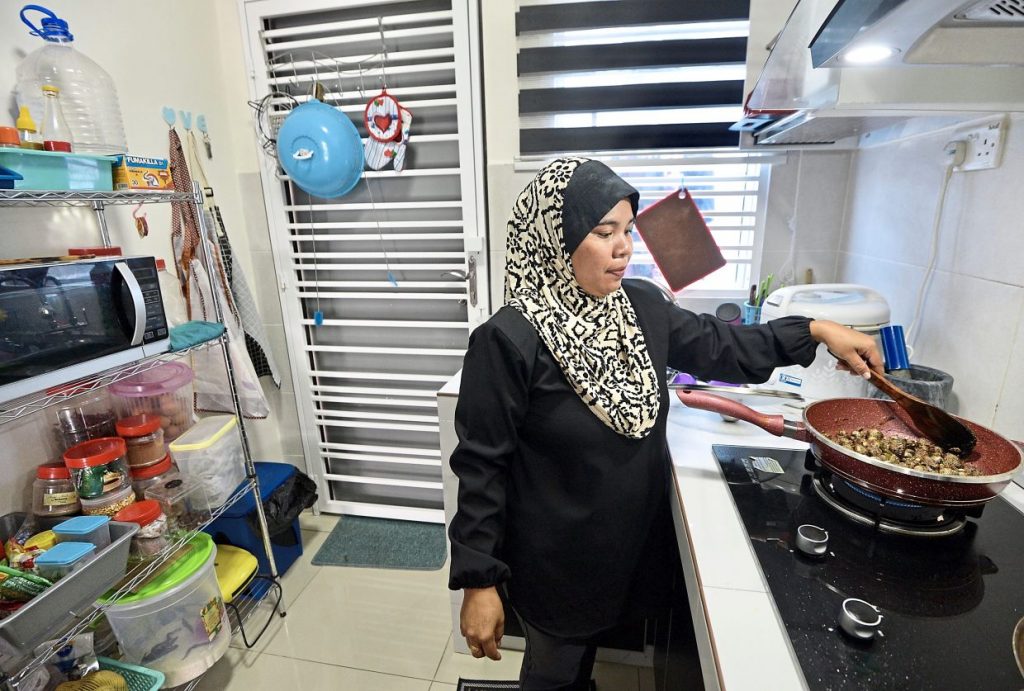
In countries such as Singapore, having a live-in maid is a luxury. Maids in Singapore would earn around SDG$600 (RM 1875) per month depending on the nationality of their household. Expatriates living in Singapore tend to pay a bit more[9].
But in Malaysia, it is a common presence even in middle-class households to have a domestic helper. This owes to the fact that domestic workers are paid meagrely. Their monthly salary has been as low as RM500 a month in 2011[4].
The Indonesian government demanded better wages and this has increased to a range of RM1,200 to RM1,500 a month. Filipino nationals working as a maid, on the other hand, received an average of RM1,670 a month[10].
All Work And No Play
Under the Employment Act 1955, domestic workers are entitled to a one-off day per week. However, during the cycles of movement control order (MCO) where it was compulsory to stay at home, domestic workers were trapped to work even during their off days.
Tenaganita, a local NGO working to uphold the rights of the migrant workers found that the pandemic had further aggravated the workload of the domestic workers as 101 cases were received by the organisation up until December 2020[11].
Umy** from East Java has been working for her employer for the past 10 years and has described them as “good” employers. Umy works 14 hours a day, and in the past, she looked forward to Sunday to spend time with her friends. However, during MCOs, she was working 7-days a week as she was at home, with no additional overtime pay[12].
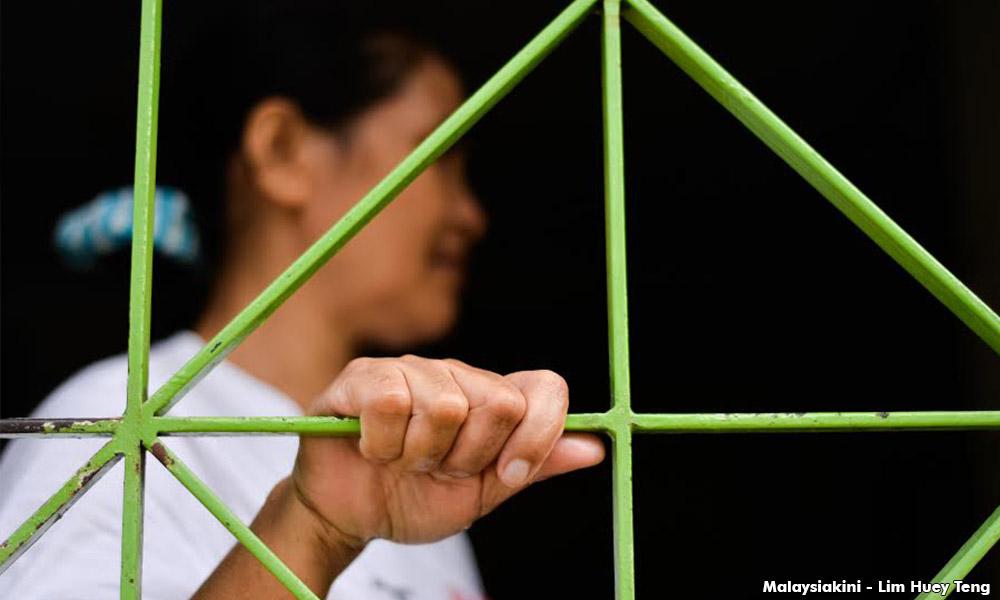
We don’t have an off day this month. If we work as usual on holidays, isn’t that considered overtime? – Umy, a domestic worker from East Java[12]
The long working hours reported by Umy are due to no regulated working hours stipulated in the Malaysian legislation. Domestic workers have reportedly started working as early as 4.30am before the household is awake and kept working throughout the day, sometimes till night[4].
At the same time, Umy’s workload increased during the lockdowns. She lamented that she was instructed to cook twice a day for the household, previously, she had only cooked twice or thrice a week.
Usually, I cook two or three times a week, but my employers are worried about going out. Now I have to cook every day. At least twice a day. – Umy, a domestic worker from East Java[12]
Umy shared that her friend would have to clean the house more frequently and was also tasked to look after their employer’s children during the lockdown. The work seemed never-ending for this domestic worker.
It was all work. I cleaned the toilet, all the rooms, and the walls. I cleaned the whole house. I took care of the children, one was three years old and the baby was eight months. I worked from 4:30 a.m. to midnight. Sometimes my employer asked me to wake up at 3:00 a.m. to feed the baby. I worked every day. I had no rest during the day. – Susanti Pramono, a returned domestic worker from Lombok[8]

With the additional workload and work hours during the pandemic, domestic workers were not given additional compensation.
We have more workload during the pandemic. But our salaries have remained the same. – Umy, a domestic worker from East Java[12]
However, the extended work hours and absence of off-days are just the tip of the iceberg of the abuses suffered by domestic helpers.
Income Withheld
In 2021, the Indonesian embassy handled 16 cases of maids who were exploited and did not receive their monthly wages[7].
Ana** is a domestic worker from Malang, East Java who worked with an affluent ‘Tan Sri’ family. Ana had worked for the family, tending to 6 adults and 2 babies in the first 7 years with no payment. In 2022, she was served justice and the former employer had to pay more than RM100,000 after a long mediation process[13].

The Indonesian envoy said employers had reasoned, it was justified since the maid’s daily food and drinks were under their expenses and she was living under their roof.
Sometimes, employers withhold the salary until their two-year contract is up to avoid their workers running away[7].
But, that’s not all. In her 12 years working with the family, Ana toiled 18 hours per day. She was subjected to verbal abuse and was slapped by her employer after providing the wrong medication. Dishearteningly, her former employer’s son had filed a claim forcing her to pay RM500 for “failing to give a 14-day termination notice.”
Behind Closed Doors
The Indonesian-based NGO Migrant Care estimated that 1,000 Indonesian maids are being abused every year in Malaysia[14].
400 to 800 migrants arrive each day [at the airport]. Sometimes there are 12 rape victims in one week, like in November 2003. In 2002, 12% of returning migrants reported problems, and 2% were ill. – Wahyu Susilo, executive secretary, Konsorsium Pembela Buruh Migran Indonesia (KOPBUMI[8]
In more severe cases, domestic workers suffered physical abuse such as beatings and harsh verbal abuse after making mistakes at work.
The grandmother was always angry. She never let me take a break. She always complained about my mistakes. She also hit me…. I told them [her employer], “I can take your hits, but don’t say bad things about my family. – Ulfah Aisyah,a former domestic worker who has since returned[8]
But as an NGO worker in Indonesia, Dina Nuriyati, commented:
Just because a migrant worker burns a shirt with an iron by accident, it doesn’t mean the employer should burn the worker with the iron as a punishment. – Dina Nuriyati, chairman of Federasi Organisasi Buruh Migran Indonesia[8]
During the pandemic, 9,015 domestic violence cases were reported up until August 2021[15]. As we chalked up the domestic violence in Malaysian households, there is no indication whether the numbers include the abuses against domestic workers.

But Tenaganita has seen a slight jump in the cases registered with them.
During the pandemic we found that domestic workers have been exploited and most of them were abused, mentally and emotionally tortured, and some even had dealt with physical assault and harassment. – Glorene Das, Tenaganita executive director[11]
The neighbouring countries have been reluctant to dispatch their citizens as domestic workers due to the haunting abuse that has led to deaths in the past.
Malaysians were shocked by the prolonged abuses received by Adelina in 2018. Adelina succumbed to death after experiencing multiple organ failures. Before Adelina, there were others and many more left unreported. Adelina’s former employer, Ambika A.Shan walked free from her charges in 2020[16].
Adelina died shortly after being rescued from her employer’s home. Before Adelina, there was Mey Sichan, before her Isti Komariyah, before her Mautik Hani, and more names than we can state. – Katrina Jorene Maliamauv, the executive director of Amnesty International Malaysia[16]
Some had been raped and coerced into having sex with the male in the households. But, many of these women would keep these dark secrets for fear of their lives and livelihood.
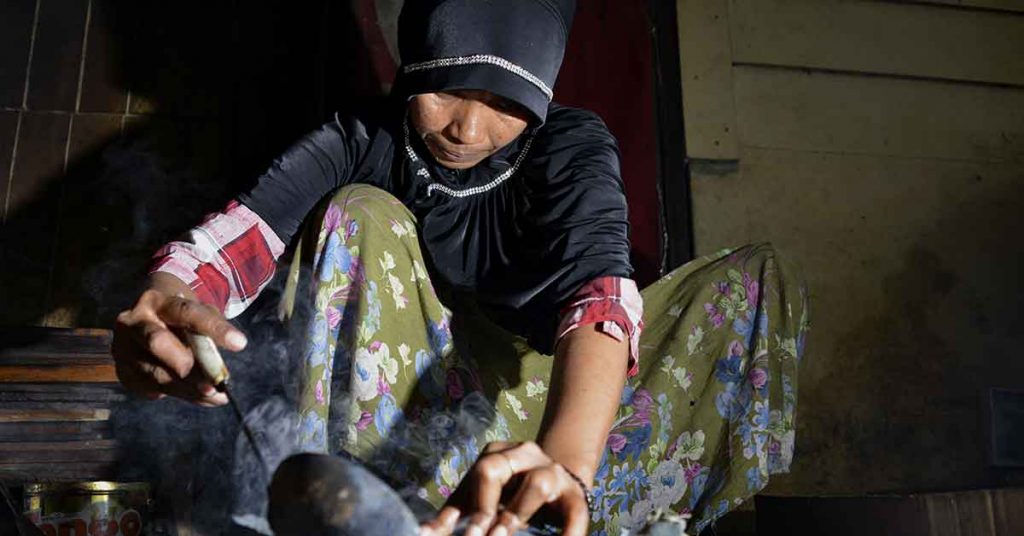
When the lady went to drop off the children to the grandmother’s house, the man would stay at home…. He raped me many, many times. Once a day, every day for three months. He hit me a lot because I didn’t want to have sex. Susanti Pramono, a former domestic worker who has since returned[8]
If discovered by their female employers, it may result in a one-way ticket home for them.
Domestic workers are systematically subject to abuse at the hands of the families they work for, with little to no legal mechanism they can rely on for protection. Despite the abuse, despite their deaths, justice remains elusive for too many. This is a failure of our society, of our system, and one we should not accept. Katrina Jorene Maliamauv, the executive director of Amnesty International Malaysia[17]
Better Future For Domestic Workers
After 6 years of negotiation between Indonesia and Malaysia, a new MOU was signed in April 2022. The MOU stipulated that there would be a number of protections in place for Indonesian domestic workers such as eight days of annual leave per year and a “one helper per household” rule preventing employers from shuttling their employees between different households[3].
However, there has been pushback, especially in terms of the minimum wage requested by the Indonesian government; which is RM1,500 as the Malaysian minimum wage is still set at RM1,200. At the same time, the Indonesian government insisted that households planning to employ domestic workers should have a minimum household income of RM7,000[18].
In 2021, SOCSO coverage is extended to the feminised sector providing better safety nets to the employees in case of workplace injuries[19].
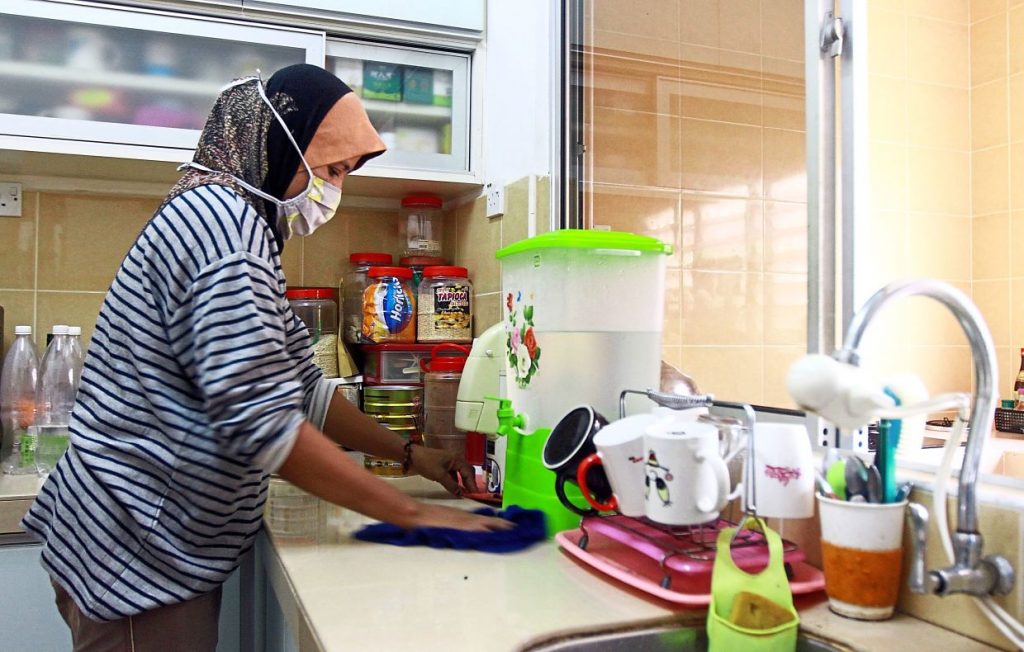
Even so, there are overarching changes in the legislation that requires examination.
Domestic workers have long been exempted from worker rights listed in The First Schedule of the Employment Act 1955. Due to this, they have been singled out from basic labour rights such as working hours, rest days, conditions of service and even maternity benefits. Until today, domestic helpers are categorised as “servants” under the Act[20]. A legislation that NGOs such as Persatuan Sahabat Wanita Selangor through their #KakakJugaPekerja campaign has been championing.
Further, the existing Anti-Trafficking In Persons and Anti-Smuggling of Migrants (Atipsom) Act 2007 do not protect domestic workers prone to trafficking or forced labour[20].
Without strong legislation in place, mistreatment and abuse of domestic workers would only continue. Stories like Umy, Ana, Susanti and Ulfah will continue to remain hidden behind closed doors.

No one seems to be even equipped to look out for them from the beginning until the end since case management is fragmented across different agencies attending to different aspects of a case. – Glorene A Das, Tenaganita executive director[20]
Have A Little Compassion
The appalling treatment of domestic workers is one that is less exposed by the media, only cracked open when the abuses have turned into deaths. The stories of the domestic workers such as Umy and Ana showed the raw dark side behind each household.
The news of graphic physical abuses experienced by the late Adelina addresses the entitlement some employers lord over their domestic workers.
Perhaps, it is rooted in the xenophobic sentiments that many Malaysians have carried for years and supported by the discriminatory way we have addressed domestic workers using terms such as “orang gaji” and “bibik”.
Just like how many Malaysians have viewed migrant workers in different sectors, once again we fail to remember helpers are human with their own sets of interests, families and loved ones.
Their main intention in travelling to Malaysia is to earn a better income for their families back home. But, in employing their help, some households have taken advantage of their roles.
Ana had successfully received compensation over the salary that was kept away from her in 2022. She returned to her family determined to start anew with a dream of her own.
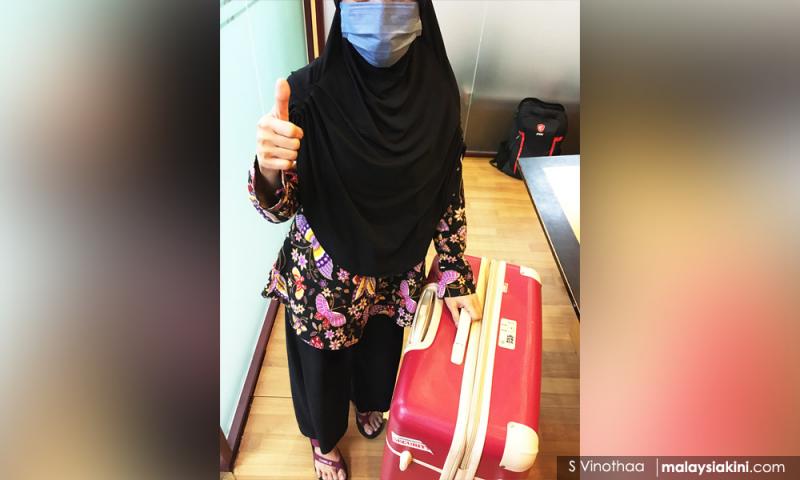
I plan to hire some workers to start growing vegetables on my parents’ land and when I hire workers, I will treat them fairly, by giving them good leave and working hours. – Ana, a domestic worker abused by her ‘Tan Sri’ employe [12]
As 30,000 prospective employers wait with bated breath for the help they seek, perhaps, it is also time to remember as current or future employers of domestic helpers, we have the responsibility of ensuring that their basic rights are upheld. Currently, the existing system of hiring domestic workers is through agencies or direct hires.
However, the Indonesian government has also insisted on One Single Channel (OCS) to better monitor their citizens after the rounds of negotiations are being scrutinised further.
At the same time, consider enrolling the help of ethical recruitment agencies such as Pink Collar to assist you in finding the right fit.
**Names have been changed for privacy purposes.
Explore our sources:
- C.Chung. (2020). Call to let new maids enter M’sia too. The Star. Link
- The Sun Daily. (2022). 30,000 employers in dire need of domestic helpers. Link
- V.Tan. (2022). Malaysia employers look forward to hiring Indonesian domestic workers again, but fees remain a concern. Channel News Asia. Link
- L.Gooch. (2011). A Cry for More (Domestic) Help in Malaysia. The New York Times. Link
- Straits Times. (2018). Indonesia mulls ban on sending maids to Malaysia after abuse case. Link
- FMT Reporters. (2022). Maid abuse reports stall MoUs with Indonesia, Cambodia. Free Malaysia Today. Link
- Daily Express.com. (2022). Indonesian maids facing modern-day slavery in Malaysia, unlike in Singapore, HK, Taiwan: Envoy. Link
- Human Rights Watch. (2004). Help Wanted: Abuses against Female Migrant Domestic Workers in Indonesia and Malaysia. Link
- S.Neogy. (2021).How Much Does It Cost To Hire A Maid In Singapore In 2021? Yahoo Singapore. Link
- J.Bunyan. (2022).Report: Maid agencies seek govt clarification over hiring of foreign workers as demand shoots up in new year. The Malay Mail. Link
- D.Murad. (2021).NGOs: Situation worse for domestic workers after Covid-19. The Star. Link
- C.C.Low. (2020). Derita dalam diam pembantu rumah. Malaysiakini. Link
- S.Vinothaa. (2022). ‘Tan Sri’ bayar lebih RM100,000 gaji pembantu rumah tertunggak. Malaysiakini. Link
- Z.Z.Datta. (2022). Why Malaysians Don’t Deserve to Have Maids. The Full Frontal. Link.
- R.Rahim, T. TAN, M.CARVALHO and F. ZAINAL.(2021). Over 9,000 domestic violence cases recorded since MCO began, Rina Harun tells Parliament. The Star. Link
- M.V.Ang.(2020).Court of Appeal Upholds Decision To Let A Woman Walk Free Of Allegedly Murdering Her Maid. SAYS. Link
- Amnesty International Malaysia. (2020). LETTER | End culture of violence, discrimination against domestic workers.Malaysiakini. Link
- The Star. (2022). Minimum household income to hire worker is RM7,000, says Indonesian envoy. Link
- Persatuan Sahabat Wanita Selangor. (2020).COMMENT | New safety net for domestic workers a giant leap forward. Malaysiakini. Link
- T.Lokman. (2021).Domestic workers continue to be treated as servants without the Proposed Employment (Domestic Employee) Regulations 2019. Sinar Harian. Link
